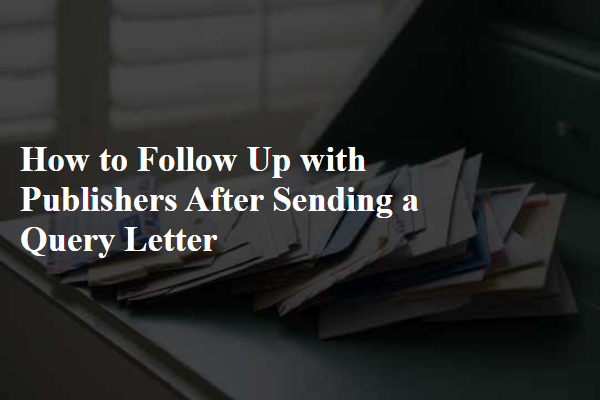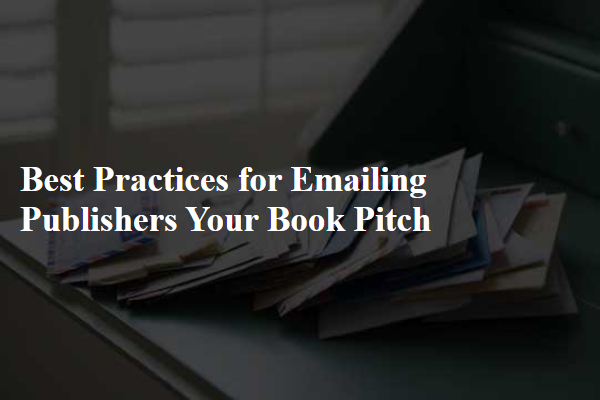
After sending a query letter, give publishers at least two to three weeks to review your submission before following up with a polite and concise email. Reference your original query, express continued interest in their consideration, and offer to provide any additional materials they might need. Maintaining professionalism and patience increases the likelihood of a positive response from publishers.
Understanding the Ideal Follow-Up Timeline
Following up with publishers after sending a query letter is essential to maintain professional communication and demonstrate genuine interest. Proper timing and clarity in the follow-up can improve the chances of receiving a response.
- Wait Appropriately - Allow at least four to six weeks before following up to respect the publisher's review timeline.
- Be Concise and Polite - Craft a brief, courteous email that references your original query and expresses continued interest.
- Include Relevant Details - Mention the title of your project and the date the query was sent to help the publisher locate your submission quickly.
Crafting a Professional Follow-Up Email
Following up with publishers after sending a query letter is crucial to maintain professionalism and keep your submission top of mind. Effective follow-up can increase the chances of your manuscript being reviewed and considered for publication.
- Wait patiently - Allow at least two to four weeks before sending a follow-up email to give publishers sufficient time to review your query.
- Be concise - Keep your follow-up message brief and polite, restating your interest and referencing your original query.
- Include essential details - Mention your manuscript title, submission date, and any previous correspondence to help publishers quickly identify your query.
Consistent yet respectful follow-up demonstrates your professionalism and enthusiasm for your project.
Subject Lines That Get Noticed
How can you effectively follow up with publishers after sending a query letter? Wait at least two to three weeks before reaching out again to give them ample time for review. Keep your follow-up message concise and professional, referencing your original query clearly.
What is the best method to follow up with publishers after a query submission? Email remains the preferred communication channel as it is less intrusive and easily documented. Avoid phone calls unless explicitly invited by the publisher to inquire about your submission.
How should you phrase a follow-up message to a publisher after a query letter? Use polite language expressing continued interest in your manuscript and gently inquire about any updates. Avoid sounding demanding or impatient, ensuring your tone maintains professionalism throughout the correspondence.
When is it appropriate to send a second follow-up after no response to the first? If there is no reply after your initial polite follow-up after two to three weeks, consider sending one final message several weeks later. Persisting beyond two follow-ups may be perceived as unprofessional or pushy by publishers.
What information should be included in a follow-up email to a publisher after a query letter? Include the original query letter's date, the title of your manuscript, and a brief reminder of your project's genre or unique elements. This helps the publisher quickly recall your submission without needing to search again.
What to Include in Your Follow-Up Message
Following up with publishers after sending a query letter is essential to demonstrate professionalism and continued interest. It helps keep your submission on their radar without appearing intrusive.
Wait at least four to six weeks before sending a follow-up email to give publishers adequate time to review your query. Keep your message concise, polite, and reference your original submission clearly. Express appreciation for their time and consideration while gently requesting an update on your query's status.
How Long to Wait Before Following Up
Following up with publishers after sending a query letter is essential to maintain communication and demonstrate professionalism. Wait at least four to six weeks before reaching out to allow time for review.
Send a concise, polite email referencing your original query and expressing continued interest in working together. Avoid aggressive language to keep the relationship positive and open for future opportunities.
Common Mistakes to Avoid in Follow-Ups
Following up with publishers after sending a query letter demonstrates professionalism and reinforces your interest in your project. Wait at least two to three weeks before reaching out to allow sufficient time for review.
When you follow up, keep your message concise and polite, referencing your original query and the date it was sent. Express appreciation for their time and consideration to maintain a positive tone.
Responding to Silence: When No Reply Arrives
Following up with publishers after sending a query letter is crucial to maintain professionalism and demonstrate genuine interest. Wait at least 4 to 6 weeks before sending a polite follow-up email, referencing your original submission and asking for any updates. Keep the message concise, respectful, and focused on your eagerness to hear back without pressuring the recipient.
Maintaining Professionalism in Every Interaction
Following up with publishers after sending a query letter is crucial for maintaining professional communication and increasing response rates. Timely and respectful follow-up demonstrates your genuine interest while keeping your submission top of mind.
- Wait at least 4 to 6 weeks - Allow sufficient time for the publisher to review your query before reaching out again.
- Send a concise and polite email - Briefly remind the publisher of your previous query and express continued interest without appearing impatient.
- Include relevant details - Reference your query letter's submission date and project title to help the publisher quickly identify your correspondence.
Multiple Submissions: Updating Publishers on Offers
Following up with publishers after sending a query letter is essential to demonstrate professionalism and maintain communication. Wait at least 4 to 6 weeks before sending a polite follow-up email to inquire about the status of your submission. Include a brief reminder of your query, express continued interest, and thank them for their time and consideration.
Knowing When to Move On and Query Elsewhere
| Step | Details |
|---|---|
| Wait Time | Allow 4-6 weeks after sending the initial query letter before following up to give publishers adequate time to review submissions. |
| Research Publisher's Guidelines | Review publisher or literary agent guidelines for follow-up instructions to ensure compliance with their preferred communication methods and timelines. |
| Compose a Professional Email | Write a concise and polite email referencing the original query, including the submission date, manuscript title, and a brief reminder of your work's genre or premise. |
| Subject Line | Use a clear subject line such as "Follow-Up: Query Letter Submission - [Your Manuscript Title]" to help editors easily identify your email. |
| Keep It Brief | Limit the follow-up email to 2-3 short paragraphs reaffirming your interest and politely inquiring about the status of your submission. |
| Maintain Professionalism | Avoid being pushy or demanding; maintain a courteous tone to foster positive relationships with publishers or agents. |
| Include Contact Information | Provide your full name, email address, phone number, and any relevant social media or author website links for easy reference. |
| Track Submissions | Keep a record of all submission and follow-up dates in a spreadsheet or journal to manage communication efficiently and avoid duplicate follow-ups. |
| Prepare for Responses | Stay ready for any reply, whether a request for more materials, a rejection, or acceptance, and respond timely and professionally. |
| Next Steps After No Reply | If no response is received after a second follow-up, consider submitting to other publishers or agents without sending further emails to the original contact. |



Comments